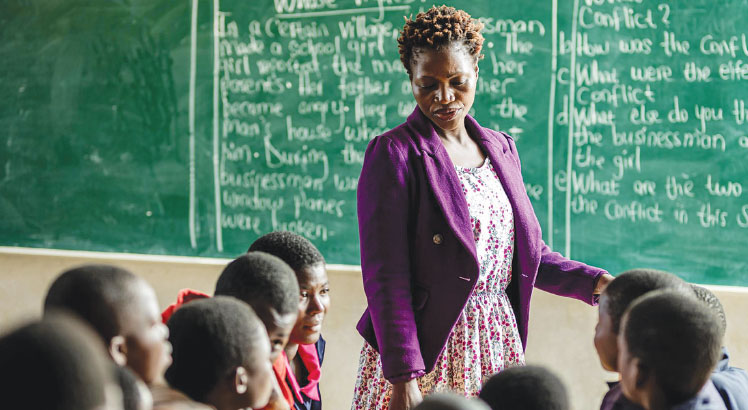Mentors keep children in schools
At 16, Ruth Phiri dreams of becoming a lawyer to protect the rights of women and children.
“I envy their reasoning, gowns and wigs. I want to help the voiceless get justice,” says the Form Two girl at Providence Industrial Mission (PIM) Community Day Secondary School in Chiradzulu District.
She smilingly shares her stellar dream with anyone who can help. However, soft-spoken teacher Bernadette Thawani has become her go-to mentor and confidante.
Ruth recalls: “When I first approached the mathematics teacher, she quickly spotted my potential and mentored me with a smile that assured me that I had met the right person.
“She told me the top secrets to success are hard work, focus and staying in school instead of rushing for marriage. She advised me to read hard and improve in history, English, Bible Knowledge, Geography and general knowledge.”
Thawani is among the mentors trained under the Malawi Teacher Effectiveness Enhancement Programme (Miteep) for quality teaching and learning. Unicef is supporting the Malawi Government to deliver the teacher and learner mentorship programme with funding from the Royal Norwegian Embassy.

This comes in response to falling education standards marked with high repetition and dropout rates despite the increased enrollment since the introduction of free primary education.
Unicef is supporting the education system to motivate and retain teachers through continuous professional development and mentorship as well as improved access to quality pre-service and on-the-job training.
Edukans Foundation has rolled out the teacher-to-teacher mentorship programme in Chiradzulu, Nsanje, Thyolo, Mangochi, Dedza and Salima, which have the lowest learning outcomes.
The trainings target 1 000 teachers in both primary and secondary schools in Chiradzulu to reinforce their teaching techniques for learners’ benefit. These teachers are expected to mentor at least 20 000 learners and create safe spaces for peer mentorship.
To improve efficiency, Thawani interactively imparts her knowledge and experience to learners and her fellow teachers.
The major winners are the learners at risk of quitting school too early due to rampant teen pregnancies, child marriages and lack of role models.
The interventions include role modeling as well as counseling by mother groups that trace and rescue dropouts, including girls affected by teen pregnancies and child marriages.
“I open up to Madam Thawani because she is approachable. She listens hard and gives advice without judging anyone. Some teachers simply don’t care about your feelings and issues you share with them,” Ruth states.
The 53-year-old teacher is happy that both learners and teachers are benefitting.
She narrates: “I approach everyone with respect and a listening ear. Having been a teacher for 31 years, I know teaching is not easy. However, my job gives me joy because I play with children, make them happy and help them grow into future leaders.
“From the two-day introduction to mentorship for headteachers to another two-day session for deputy headteachers and section heads and a day-long evaluation of how we were mentoring fellow teachers and our learners, the training was worthwhile and I’m delighted that both teachers and learners are happy with improved outcomes of the mentorship they get as individuals or in groups.”
The teachers-turned-mentors also support slow learners and children with special needs, ensuring no one lags behind.
“Teachers for learners with special needs are few in rural schools, so we all have to pay close attention to every child so that those with unique personal and education needs are not left behind,” Thawani explains.
She stopped giving children corporal punishment or sending them back, which violates their rights and love for schooling.
“These days, I teach with a smile and also consult my colleagues when I encounter a problem. Recently, I had a friendly chat with boys and girls who went out of bounds to take liquor at PIM market in the vicinity. After I reached out to them in a motherly tone, they opened up about their drinking problems, apologised and promised to change.”
And teachers are also benefitting from peer-to-peer mentorship.
They include Laureen Kapasule, who taught for eight years at Goleka Primary School in the district before being transferred to PIM in February 2022.
The switch got off to a stuttering start with some learners demeaning her: What can a newcomer teach us?
Within six months, they locked her outside their classroom and threatened to strike against the teacher of physics.
The 31-year-old teacher recalls: “The uncooperative learners made the transition to secondary rough because I was new in the system.
“They weren’t interested in my lessons. I felt belittled and rejected. This affected my morale and self-esteem, but everything changed when I opened up to my colleagues, including Madam Thawani. The mentor assured me I would get better with time if I stopped being aggressive and thoroughly prepared for lessons. I no longer interact with the students as my foes.”
Kapasule is reaping the benefits of putting the pep talk to good use as some once naughty learners have become keen listeners and her admirers.
“Thanks to the counseling from mentors, I felt better that after sitting their Junior Certificate of Education examinations in May, the children who made me feel it was better to quit or get transferred came to acknowledge my role in their lives,” she states.
The teacher who grew up dreaming of becoming a nurse no longer feels denied or the urge to quit. She is one of the nine female teachers in a staff of 21.
Two teachers and six heads of section received mentorship training.
“The mentorship I received has made me a better caregiver not only to the students but also to my four children who openly discuss their sexuality and dreams with me,” says Thawani.





